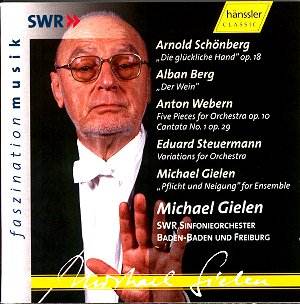This exceptionally well-filled disc could almost act
as the artistic credo of Michael Gielen. It shows him at his best; as
a conductor in repertoire that no one can better him in, and as a composer
of enviable range and technical skill. The orchestral playing is of
a generally very high standard (as one has come to expect here) and
all soloists try to match their conductor’s vision and commitment.
The programme is both stimulating and logical. It opens
with a piece from the height of Schoenberg’s Expressionist period, where
the harmonies were largely free-floatingly atonal, the melodic lines
angular and the instrumentation exotic and dissonant. The scenarios
from this phase are all angst-ridden or nightmarish. And the nightmares
don’t come much more extreme than Die Glückliche Hand (here
translated as The Blessed Hand, more usually The Lucky, or
Fortunate Hand). This stage drama, written only months after Erwartung,
starts with the following directions, "The stage is almost entirely
dark. A man is lying in the foreground, his face to the floor.
On his back sits a fabulous cat-like beast, a hyena with wings like
a bat, which seems to have its teeth stuck into the nape of his
neck." Maybe it’s this sort of stage instruction, or it only
lasts around 18 minutes, that accounts for the fact that this piece
is rarely performed. Actually, it contains music of great beauty and
subtlety, and was revered by Schoenberg’s followers as one of the best
examples of Second Viennese School thinking at the time. The four scenes
are tightly knit, and it’s good to hear performances of amazing accuracy,
given the difficulty (especially for the chorus) of the chords and melodies.
The orchestral palette is stunning, and Gielen doesn’t miss a trick,
acutely observing the composer’s plethora of markings.
The other works on the disc all seem to follow logically
from this beginning. Berg’s concert aria Der Wein (The Wine)
is a heady, richly dark setting of Baudelaire, and tells of the delights
and perils of intoxication. With instrumental prominence given to saxophone
and piano we get more than a glimpse of Lulu to come, and when
Gielen speaks of the work’s ‘beautiful vulgarity’, he is being complimentary.
It is also tightly organized, and constantly reminds one of the Chamber
Concerto, where the rigours of serial techniques are tempered by
a late-Romantic yearning. The orchestral contribution is outstanding,
though I find Melanie Diener just a shade cool for my liking, particularly
compared with the sensuous sheen of Ann Sophie von Otter for Abbado
(DG).
The Webern Op.10 pieces are right up Gielen’s street,
and his handling of their crystalline delicacy is second to none. No.
4, which lasts a mere 34 seconds, gives us simply three renditions of
the note-row, as if there is nothing more to be said. It reminds me
of a play by Beckett or Pinter, where the silences and pauses are as
important as the notes (or words).
The Cantata Op.29 comes from some 27 years later,
and shows Webern’s mastery of total serialism. What’s really astonishing
is that it actually sounds richer, grander and more romantic than the
earlier pieces. The choral writing is very assured, reminding us of
Webern’s expertise in the field of vocal writing.
Eduard Steuermann was a devoted disciple of Schoenberg
and as his nephew, Michael Gielen, rightly points out, his short, terse
Variations for Orchestra show a style that is ‘something like
a combination of Webern’s brevity and compactness and Schoenberg’s expressive
mood’. You could add Mahler into the mix, but there is individuality
here, and to say Steuermann is best remembered as a pianist (preparing
the premiere of Pierrot Lunaire and making many important piano
reductions) does scant justice to his orchestration which is astonishingly
varied and brilliant. Gielen revels in these colours, coaxing playing
of great range and warmth from his excellent band.
It seems logical to end with a piece by Gielen himself.
It is, by some margin, the longest on the disc (over 25 minutes). The
title Pflicht und Neigung is translated as ‘Obligation and Inclination’,
and the work was premiered in 1989 by Ensemble Modern conducted, of
course, by the composer. It perhaps could have benefited from the sort
of tight compositional procedures we hear in the other works, but still
has enough variety of texture and harmonic interest to just about sustain
its span. It is in three clear parts, of which the most interesting
is the last, where the constantly shifting moods and overlapping sonorities
(from percussion and winds) create an interesting and characterful sound
world. The performance must be considered definitive.
This is a useful and stimulating overview of certain
aspects of central European music through the 20th Century.
It is all beautifully executed and though the recordings span a decade,
they are pretty uniform in their high quality. Booklet notes (by Paul
Fiebig) are of a high order, with illuminating contributions from Gielen
himself. Texts are not included, though Hänssler encourage us to
download from their website. This proves straightforward, and one is
rewarded with full translations in well-spaced, easily readable print.
Highly recommended.
Tony Haywood

![]() SWR Symphony Orchestra
Baden-Baden and Freiburg/Michael Gielen
SWR Symphony Orchestra
Baden-Baden and Freiburg/Michael Gielen ![]() HÄNSSLER CLASSIC
CD 93.060 [78’08]
HÄNSSLER CLASSIC
CD 93.060 [78’08]